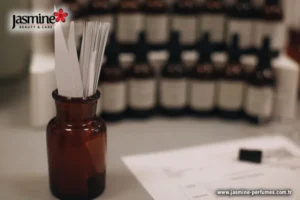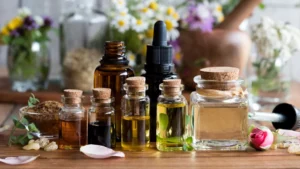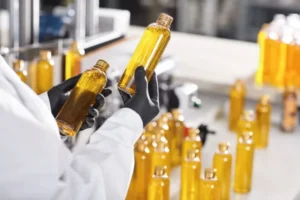It’s the details that always make the difference, especially in the world of perfumes. In this industry, every nuance matters, no matter how small. Mastering fragrance terms not only showcases your professionalism but also attracts customers and elevates the value of your brand.
In today’s article from Jasmine, we’ll explore the importance of perfume Terms, why understanding it is crucial, and how using it smartly can positively impact your business. We’ll also highlight some of the most common terms you need to know. Let’s dive in.
Why is perfumery jargon important in trade?
You might ask, why should I be familiar with perfume terminology?
Here’s why understanding these terms is essential and how it benefits your business:
Understanding the Product
When you grasp terms like “notes” and “concentration,” you gain a clearer understanding of a fragrance’s composition. This allows you to better assess quality, distinguish between different types, and make well-informed purchasing decisions.
Building Trust with Customers
Using accurate terminology and professional language when describing perfumes strengthens your credibility and demonstrates expertise. Professional communication builds customer trust in your store and products, encouraging them to buy with greater confidence.
Developing Effective Marketing Strategies
A solid understanding of fragrance terms helps you design more targeted and impactful marketing campaigns. You can appeal directly to customers based on their scent preferences, increasing sales and expanding your customer base.
Choosing the Right Suppliers
In-depth knowledge of perfume terminology enhances your ability to communicate and negotiate with suppliers. It enables you to accurately evaluate product quality and ensures that your suppliers meet your business needs effectively.
The Language of Perfume in Business Communication
With Suppliers
Using the correct terminology when dealing with perfume suppliers allows you to request products with precision and reduces the risk of errors. You’ll be able to specify details such as the type of essential oil or concentration level, ensuring you receive exactly what you need.
With Customers
Being familiar with perfume terminology enables you to explain differences between fragrances and describe scents in a professional way. This equips you to answer customer questions confidently, ultimately guiding them—indirectly but effectively—toward making a purchase.
In Marketing
Specialized terminology highlights your expertise. It helps you craft detailed, professional product descriptions for your website or social media channels, showcasing your brand and attracting customers who value trustworthy quality.
Don’t miss the opportunity to elevate your brand. Contact Jasmine today for premium fragrance products that strengthen your position in the market and meet your customers’ expectations.
Also read: Fragrance Families: Understanding Scent Categories

10 perfume terms you ought to know
| English Term | Arabic Terms | Explanation |
| Top Notes | النوتات العليا | The scents that appear immediately upon spraying the perfume. They are light and refreshing but fade quickly, lasting about 10–15 minutes. |
| Middle Notes | النوتات الوسطى | Known as the “heart” of the fragrance, these emerge after the top notes fade. They are warmer, more stable, and last for several hours. |
| Base Notes | النوتات القاعدية | The foundation of the perfume, appearing after the middle notes. They are heavy, deep, and provide long-lasting fixation on the skin. |
| Fragrance Family | العائلة العطرية | Categories of scents based on their primary components, such as floral, woody, or oriental families. |
| Sillage | فوحان العطر | The fragrant trail a perfume leaves in the air after someone passes by, indicating its strength and diffusion. |
| Longevity | ثبات العطر | The duration a fragrance lasts on the skin—one of the key factors that defines quality. |
| Perfume Concentration | تركيز العطر | The ratio of aromatic oils to alcohol in a perfume, determining its strength and longevity. |
| Eau de Parfum (EDP) | أو دو بارفان | A fragrance type with a high oil concentration (15%–20%), offering strong longevity and projection. |
| Eau de Toilette (EDT) | أو دو تواليت | A lighter fragrance type with a lower concentration (5%–15%), making it fresher and less long-lasting. |
| Flanker | فئة عطرية | A new fragrance released as a variation of an existing one, sharing the same name but differing in composition and formula. |
What are the 4 main fragrance families?
Perfumes are categorized into fragrance families to make it easier to understand their characteristics. Here are the most prominent ones:
Floral Family
Widely used in women’s perfumes, this family is built around floral notes such as jasmine, rose, and orange blossom. These scents add a romantic touch, making them perfect for everyday wear. Their universal popularity helps you appeal to a broad customer base.
Oriental Family
Known for its rich, warm ingredients like amber, musk, vanilla, and incense. Oriental fragrances are powerful and long-lasting, evoking a sense of luxury and mystery. They are crafted for both men and women and are especially suited for evenings and special occasions.
Woody Family
Characterized by earthy, warm notes of sandalwood, cedarwood, vetiver, and patchouli. Woody scents convey strength and sophistication, often featured in men’s perfumes and ideal for formal occasions.
Citrus Family
Recognized for its fresh, vibrant notes of lemon, orange, and grapefruit. Light and energizing, citrus fragrances are perfect for daily wear in summer, offering a refreshing burst of vitality. An excellent choice for those who prefer crisp, uplifting scents.
Aquatic Family
Defined by clean, airy accords that evoke the freshness of sea breezes or rainfall. These scents are ideal for hot days and sporty lifestyles, delivering a sense of vitality. As a relatively modern family, aquatic fragrances have quickly gained wide popularity.
What are the main notes of a perfume?
Top Notes
The very first impression you smell when spraying a perfume. Made up of light, volatile molecules such as lemon, orange, and mint, they deliver a fresh opening but evaporate quickly usually within the first few minutes.
Middle Notes
Known as the “heart” of the fragrance, these emerge once the top notes fade. They are warmer and more stable—think rose, jasmine, and cinnamon—and form the core character of the scent. Middle notes last for several hours and are the most influential in shaping the perfume’s identity.
Base Notes
The foundation of the fragrance, appearing after the middle notes dissipate. These are heavier, long-lasting molecules such as musk, amber, and sandalwood. Base notes add depth, anchor the composition, and keep the fragrance lingering on the skin for many hours.
Accord
A harmonious blend of different notes that creates an entirely new and more complex scent than the individual components. Accords are the creative essence of perfumery, enhancing a fragrance’s appeal and showcasing the artistry behind its composition.
ِAlao read: Original Perfumes: Ingredients, How to Differentiate from Fake

Tips on using fragrance terminology effectively for perfume retailers
Here are some practical tips on how to use fragrance terminology correctly to strengthen your credibility and boost sales:
- Use Accurate Terms in Descriptions: Employ the right terminology when describing perfumes to highlight their quality and uniqueness. This enhances your brand’s credibility and positions it as professional and trustworthy.
- Communicate Professionally with Suppliers: Using precise language when placing orders ensures suppliers understand your exact specifications, minimizing errors and guaranteeing you receive the products you need.
- Create Engaging Marketing Content: Write compelling copy for social media that speaks to specific customer groups based on their fragrance preferences. This targeted approach attracts the right audience and increases conversions.
- Guide Customers in Choosing Perfumes: Share expert advice with your clients on selecting the right fragrance, drawing on your knowledge of fragrance families and note compositions. This adds value to their experience and builds loyalty.
- Organize Products Clearly Online: Categorize your perfumes on your website in a simple, structured way, making it easy for customers to find the scents they love.
Connect with the experts at Jasmine, and let us help you select innovative fragrance products tailored to your business needs.
Jasmine – The Leading Turkish Perfume and Fragrance Manufacturer
In today’s competitive fragrance market, having a distinctive product is the key to success. Jasmine is your ideal partner in Turkey, offering fragrance products that combine deep-rooted Turkish expertise with world-class quality. By working with us, you can build your brand on a solid foundation.
To strengthen your position in the perfume market, choose Jasmine because we:
- Offer over 200 varieties of perfumes and air fresheners, catering to your customers’ diverse tastes and boosting your sales.
- Adhere to international manufacturing standards, using natural fragrance oils that ensure lasting longevity and captivating aromas, building customer trust in your store.
- Provide flexible logistics support through more than 70 agents worldwide, making product importation fast and efficient.
- Deliver custom manufacturing services to help you create your private-label brand.
- Stand out with pricing options to suit all budgets, enabling you to achieve healthy profit margins while keeping customers satisfied.
Start building your fragrance brand with confidence. Connect with our team at Jasmine, and let our expertise and quality guarantee your success and distinction in the perfume market.
Also read: Leading Private Label Perfume Manufacturer in Turkey

FAQs About Perfume Terms
What does fl oz in perfume mean?
What does EDP mean in perfumes?
EDP is short for Eau de Parfum, a French term referring to perfume concentration. It typically contains 15%–20% aromatic oils, giving it strong longevity and projection.
What’s the difference between EDT and EDP?
EDP (Eau de Parfum) has a higher concentration of aromatic oils, making it longer-lasting. EDT (Eau de Toilette) has a lighter concentration, so it’s fresher but less enduring.
What does 80% volume mean in perfume?
What’s the difference between Eau de Parfum and Eau de Parfume?
There is no difference—Eau de Parfum and Eau de Parfume are simply two ways of pronouncing or writing the same French term, both referring to the same concentration category.
What’s the difference between fragrance and perfume?
Fragrance is a broad term referring to any scented product, including perfumes and fragranced cosmetics. Perfume, however, is a specific type of fragrance with a high concentration of aromatic oils, most often referring to liquid perfumes.